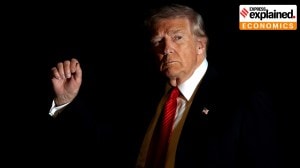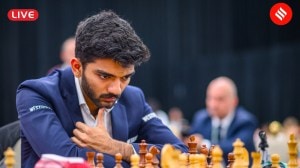The diplomacy of deals
The President of China’s major oil and gas company, PetroChina, Huang Yan, was quite categorical about the business-to-...

The President of China’s major oil and gas company, PetroChina, Huang Yan, was quite categorical about the business-to-politics trade off. "If Beijing wins a bid this year to host the 2008 Olympic Games", said Huang to a correspondent of Reuters News Service, "then the Royal Dutch/Shell Group can hope to secure early government approval for a new gas pipeline." The proposed pipeline will pump natural gas from the newly discovered Sulige field in the gas-rich Ordos Basin in China’s northern region of Inner Mongolia to the rapidly developing east.
It’s a straight trade-off between a business opportunity and a diplomatic gain, with a business profile. Shell lobbies Western capitals, using all its persuasive skills, to get votes for Beijing in the race for hosting the Olympic Games, a generous Beijing rewards Shell with a lucrative contract. National pride and a fantastic opportunity for Beijing bought in exchange for monopoly rights to market natural gas.
Imagine if Power Minister N K P Salve had said to the Enron CEO way back in 1991, "if you lobby with your government and get them to get Pakistan off our back, we will allow Enron to make money running a power plant in India". Or, something more business-oriented like, "if you can lobby with the US Congress to get the sanctions against export of dual-use technologies lifted, you can fleece our power users". It’s a way of getting Indian power consumers to pay for getting access to usable US strategic technologies. An act of patriotism, like Huang’s.Imagine again Maharashtra Chief Minister Vilasrao Deshmukh saying to the present Enron CEO, or indeed to the US Ambassador, Richard Celeste, who called on him last week, "if you can help us crack the link between the Mumbai underworld and Pakistan’s ISI, we will settle all matters on the Dabhol Power plant to your satisfaction." Every Mumbaikar will pay an extra two rupees for power if the CIA can help get the ISI out of Mumbai.
Imagine again if the Union government had said to the US last year, "we will eliminate quantitative restrictions on imports ahead of the required schedule provided you lift sanctions on India, or cut the nonsense out on the CTBT stuff". Imagine if we had done some of this "give-and-take" dealing during the Uruguay Round negotiations instead of saying ‘No’ till one day and saying ‘Yes’ from another. Look at the way the Chinese negotiated their entry into the World Trade Organisation.
Sure Indian politicians know the language of trade-offs, but more likely than not they have been asking the "what’s in it for me/my son/my son-in-law/ my many other-in laws" kind of question. Whether it was Enron’s project, or a Malaysian proposal to build roads, a Singapore proposal to buy an airline, a Japanese proposal to buy up an automobile joint venture, etc. etc. The Indian ‘quid pro quos’ are normally person to person, via Swiss bank accounts. So who thinks of getting the Olympic Games to New Delhi?
The "Sulige pipeline for Beijing Olympics" swap is not the first deal of the business ‘quid’ for a political ‘quo’ kind that the Chinese have offered. They told Boeing that they could buy a few planes if the fussy US legislators would only get off their back on the Tiennanmen Square incident. "Sell a few planes, buy a few legislators and government officials, and we can be back in business" was a well known China game of the 1990s.
Indian politicians and policy makers rarely make that kind of a patriotic deal. This is not because we abhor such deal-making. Someone may say ‘but we are a democracy. China has an authoritarian state. Our system does not permit deal-making, in their’s it thrives behind the bamboo curtain’. The truth is that whenever some other guy is making money, the Indian signatory to the deal does not ask "what’s in it for my country" question. It is almost always the ‘what’s-in-it-for-me’ question. There is hardly ever any strategic thinking going into business deal-making with other nations.
The first evidence of any such thinking in recent years was available during the post-Pokhran-II and Kargil war period. Countries that stood by India appeared to be rewarded and those that didn’t saw deals being called off. But these examples are exceptions, not the rule. Even when business ‘quos’ were exchanged for policy ‘quids’, it was not clear if the message was being sent loud and clear. Consider, for example, the sugar deal with Pakistan President Nawaz Sharif. Bags of money were reportedly made by both Sharif and some of his Indian interlocutors. What did either Pakistan or India get out of that deal? What was the ‘quid pro quo’ and who made the deal. Or, was it plain and simple ‘me and my family’ deal?
Consider the recent spurt in Korean business in India. South Korean Chaebol have done well for themselves here. Was this a trade-off, considering South Korea refused to follow the US in imposing sanctions on India after the 1998 nuclear tests? Is there a ‘quid pro quo’, or is this all plain and transparent free trade?
Business deals are part of diplomacy in the increasingly globalised world we live in. Indeed, they have always been so. For centuries diplomacy was nothing more than seeking trade preferences and where this was denied, war became an other means of doing business.
In the new post-Cold War world of increasing multipolarity and globalisation, war is no longer seen as an instrument of trade and business. But business remains the focus of diplomacy. Western Europe and the US were always alive to this phenomenon. Pakistan’s former finance minister, the late Dr Mahbub ul Haq, once put it quite candidly to this writer, "each time my prime minister or president wanted to visit Paris, sometimes even just to do shopping, the French government would ask ‘what are you buying from us?’ Once the government had an official shopping list, often defence-related, our leaders could go on their personal shopping sprees."
Britain was once called a ‘nation of salesmen’, today the Chinese excel. But then in today’s globalised world, all nations are in the selling business. The world is full of politicians/diplomats-turned-salesmen. Some sell national strategies, some sell themselves.
In Asia, no one has understood and used this trade-off between business and politics better than the East Asians the Japanese, the Koreans and now the Chinese. They have each come to discover the power of the view long expressed by the US strategic analysts, T C Schelling, that "trade policy is national security policy". Trade is an instrument of national security. Diplomacy is a means of promoting business. Huang of PetroChina has been well schooled in this view. The question is, are our policymakers and diplomats so attuned, and, more importantly, are we up to it?



- 01
- 02
- 03
- 04
- 05




























